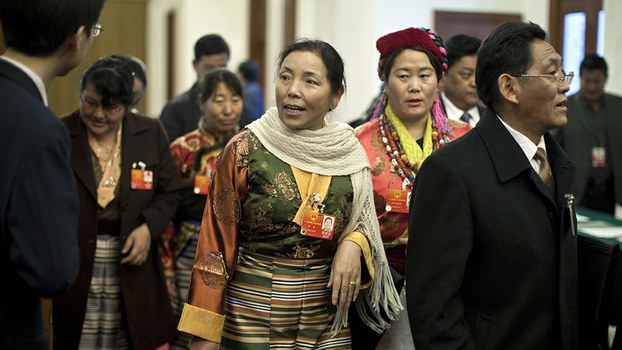




Chinese authorities have detained a Tibetan student after an essay he wrote for his civil service exam lamenting a declining number of government job opportunities for Tibetans in Tibetan regions of China went viral on social media, according to sources.
Sonam, a Tibetan master’s degree candidate at Northwest Minzu University in Gansu province’s Lanzhou city, was hauled out of classes earlier this month, according to a source inside Tibet, speaking to RFA’s Tibetan Service on condition of anonymity.
“In the beginning of April, the Tibet Education Bureau in China forcefully took Sonam away from the school,” the source said.
“Chinese officials have held him since then,” he added.
RFA could not independently verify whether officials from the Tibet Education Bureau, under China’s Ministry of Education, or authorities acting on their behalf had arrested Sonam.
A second source told RFA that Sonam was targeted because of the content of the essay he wrote for his civil service exam.
“Tibetan university student Sonam wrote the essay in Chinese about the annually declining number of seats [for Tibetans] for the Chinese government civil service exams,” said the source, who also asked to remain unnamed.
“His essay was widely shared on social networking sites, including WeChat.”
The source added that Tibetan students at Northwest Minzu University—a school formerly known as Northwest University for Nationalities which was the first minority institution for higher learning founded after the establishment of the People’s Republic of China in 1949—who maintain contact with Tibetan exiles in India “are particularly under surveillance by Chinese authorities.”
The sources noted that Tibetans in Tibetan regions of China have increasingly expressed frustration over a lack of coveted government jobs in recent years, despite claims by local officials to have increased employment opportunities.
“Although the Chinese government claims to have created many [government] jobs in Tibet, only 210 [Tibetan] graduates were selected out of 70,000 to sit for the entrance test for the civil service exams this year,” one source told RFA.
“Many Tibetan university graduates say it is increasingly difficult to find jobs in Tibet, and many of those who graduated in 2018 are still left without jobs.”
Increased competition
In February, sources told RFA that Tibetan university graduates are facing increasing difficulty finding jobs in Tibetan regions of China, with Han Chinese flooding job markets and civil service exams slanted more and more toward Han applicants.
The sources said that in 2018, there were 40,000 applicants in the Tibet Autonomous Region alone who sat for the entrance exam for positions in the Chinese civil service, but only about 3,000 passed their exams to become eligible to be considered for government positions.
With more Chinese university graduates now coming into Tibetan areas to compete for jobs, they said, ethnic Tibetans are allowed fewer opportunities and have lost their competitive edge.
The majority of Tibetan applicants are unable to find work in private companies and corporations, including high-tech firms or industry, in Tibet, making well-paying jobs in the civil sector a top priority.
But in addition to competing with an increased number of Chinese applicants, requirements for proficiency in Mandarin Chinese in testing and consideration for employment have further disadvantaged Tibetan students, as China seeks to promote the dominance of Chinese culture and language in Tibetan areas, sources say.
Language rights have become a particular focus for Tibetan efforts to assert national identity in recent years, with informally organized language courses typically deemed “illegal associations,” and teachers subject to detention and arrest.
Reported by Lobsang Gelek for RFA’s Tibetan Service. Translated by Dorjee Damdul. Written in English by Joshua Lipes.